DEWEY DEFEATS TRUMAN may be the most famous newspaper headline in the history of the medium. No one really remembers, though, why the president who won WWII was so defeatable, and why
a guy whose name reminds you of a warm, wet morning was such a shoe-in for president. Ooh please, please let me tell you all about it.
The Contenders
 President Harry S Truman (Democrat-MO) –
President Harry S Truman (Democrat-MO) – Even though he won the war, Truman had trouble escaping FDR’s sizeable shadow. He was just a failed haberdasher from Missouri who was thrown on the ticket at the last minute because then VP Wallace was too liberal. His post-war record was hardly stellar, and his regular-guy attitude hardly matched the presidentiality of his predecessor.
Governor Thomas Edmund Dewey (Republican-NY) – In 1944, he led an impressive campaign against the unbeatable Roosevelt. When Truman turned out as banal as everyone assumed he was, this towering, powerful New Yorker’s victory seemed assured.
Former Vice President Henry Agard Wallace (Progressive-IO) – Still pissed that he was replaced on the 1944 ticket, therefore not becoming president when FDR died, Wallace spent the rest of his life as Truman’s harshest critic. He basically re-formed the Progressive Party just to take Truman down.
Governor James Strom Thurmond (Dixiecrat-SC) – Before he became that bat shit crazy, racist 100-year-old Senator, Strom Thurmond was a bat shit crazy, racist presidential candidate. Like what put Breckinridge on the ticket in 1860, Democrats stormed out of the convention over Truman’s stance on civil rights.
The Fight
Let’s just list the reasons Truman didn’t have a chance:
Strike 1: A failing economy. When the bomb quickly ended the war, the economy was unprepared for the flood of veterans’ suddenly returning home and an end to wartime production, leading to wide-spread strikes. All blamed on Truman.
Strike 2: He alienated labor unions. To quell a national railroad strike, Truman threatened to draft the union members into the military. Organized labor is to this day the core of the Democratic base, and now they hated him.
Strike 3: He recognized the state of Israel. He did it against the advice of Sec. of State George Marshall, who was so popular at the time, Truman insisted the plan to rebuild Europe be named after him, instead of himself. So now Marshall supporters were against him too.
Strike 4: He de-segregated the military. The Democratic Party was still, in 1948, the party of the South. Even super liberal Wilson was super racist. So, yeah, Truman, as a human, good call. As a Democrat, not so much.
Strike 5: He was up against two Democrats. Even before the civil rights thing, Truman had to face former Democratic VP Wallace, but now he had to also face
Thurmond, who hoped to sweep Southern Democrats.
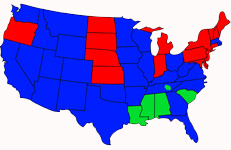
Refusing to acknowledge his election was anything but assured,
Truman went on a national train tour charming the pants off everyone he met. He promised a Fair Deal for all Americans, in order to invoke FDR’s New Deal. He charged
Dewey would undo FDR’s work, and return the country to the unstable economy that led to the Depression.
That, Truman said, would be good for the Communists.
In contrast, Dewey hardly campaigned at all. Back in ’44 the campaign devolved into a mudslinging contest with the then President Roosevelt. In '48, though, he was so far ahead in the polls, his strategists figured the best way to win was to avoid offending anyone. One journalist summed up Dewey's four major speeches with the following quotes,
“Agriculture is important. Our rivers are full of fish. You cannot have freedom without liberty. Our future lies ahead.”
The Title
People turned out in droves to vote for Truman, even though they had no hopes that he’d win.
They just liked him and wanted to show him people supported him. Add to that, his overwhelming support in the black and Jewish communities. In sharp contrast, Dewey’s bland campaign and centrist leanings didn’t exactly inspire people to get out the vote. Hardly a resounding re-election, Truman’s second term was an all-around failure, topped off by the disastrous Korean War.
In the mid-‘60s, Dewey became disillusioned with how conservative the Republican party had become and retired from public service. His most lasting contribution came in 1952, when
he convinced Eisenhower to make his running mate freshman California Senator Richard Nixon.
Next Up – Election 1960: This Guy’s Pretty, That Guy’s SweatyLabels: elections, presidents






 Refusing to acknowledge his election was anything but assured, Truman went on a national train tour charming the pants off everyone he met. He promised a Fair Deal for all Americans, in order to invoke FDR’s New Deal. He charged Dewey would undo FDR’s work, and return the country to the unstable economy that led to the Depression. That, Truman said, would be good for the Communists.
Refusing to acknowledge his election was anything but assured, Truman went on a national train tour charming the pants off everyone he met. He promised a Fair Deal for all Americans, in order to invoke FDR’s New Deal. He charged Dewey would undo FDR’s work, and return the country to the unstable economy that led to the Depression. That, Truman said, would be good for the Communists. President William Howard Taft (R-OH) – Although Roosevelt picked his friend as his successor to the presidency, Taft was a strict constitutional constructionist. He believed that all that power and authority his buddy TR scooped up went way beyond what the constitution allowed. Like his Republican predecessors, he gave all federal control back to Congress and settled into the wholly 19th Century position of just being chief administrator.
President William Howard Taft (R-OH) – Although Roosevelt picked his friend as his successor to the presidency, Taft was a strict constitutional constructionist. He believed that all that power and authority his buddy TR scooped up went way beyond what the constitution allowed. Like his Republican predecessors, he gave all federal control back to Congress and settled into the wholly 19th Century position of just being chief administrator.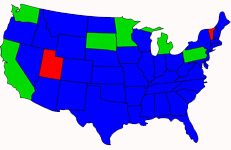 As election day grew nearer, the outcome could not have been more clear. Without Roosevelt in the mix, the majority of voters would have gone for Taft, but there was old TR screwing over his old protégé. Seeing his clear victory,
As election day grew nearer, the outcome could not have been more clear. Without Roosevelt in the mix, the majority of voters would have gone for Taft, but there was old TR screwing over his old protégé. Seeing his clear victory, 
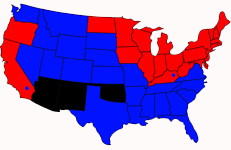 For the first time, a presidential campaign wasn’t just about songs and party platforms. The two candidates, their personalities and their politics, became the real focus of the race, and it worked. With a nearly 80% voter turnout, even though Bryan lost to McKinley, he still received more single votes than any winning candidate before him.
For the first time, a presidential campaign wasn’t just about songs and party platforms. The two candidates, their personalities and their politics, became the real focus of the race, and it worked. With a nearly 80% voter turnout, even though Bryan lost to McKinley, he still received more single votes than any winning candidate before him.
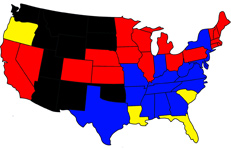 Charges of intimidation and fraud went up all over the place causing the state electors in Florida, Louisiana, Oregon, and South Carolina to send to the Senate, for final tally, two or more contradicting results. In all four cases state legislatures favored Hayes. Without these four states, Tilden fell just one vote shy of the majority needed to win. With results in limbo, and Tilden so close to winning, Congress came up with a plan. Clearly everything would be fine.
Charges of intimidation and fraud went up all over the place causing the state electors in Florida, Louisiana, Oregon, and South Carolina to send to the Senate, for final tally, two or more contradicting results. In all four cases state legislatures favored Hayes. Without these four states, Tilden fell just one vote shy of the majority needed to win. With results in limbo, and Tilden so close to winning, Congress came up with a plan. Clearly everything would be fine.
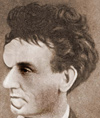 Former Congressman Abraham Lincoln (Republican-KY) – When the
Former Congressman Abraham Lincoln (Republican-KY) – When the 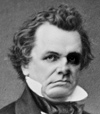 Senator Stephen A. Douglas (Democrat-VT) – Like all Democrats, Douglas, chief architect of the Kansas-Nebraska Act, saw the coming storm. If Lincoln won, the South would not tolerate him as their president. His solution laid firmly in his belief in “popular sovereignty,” that each new territory should decide their slave status on their own. Douglas represented old-school Democrats, with total devotion to liberty and populism.
Senator Stephen A. Douglas (Democrat-VT) – Like all Democrats, Douglas, chief architect of the Kansas-Nebraska Act, saw the coming storm. If Lincoln won, the South would not tolerate him as their president. His solution laid firmly in his belief in “popular sovereignty,” that each new territory should decide their slave status on their own. Douglas represented old-school Democrats, with total devotion to liberty and populism.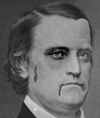 Vice President John C. Breckinridge (Democrat-KY) – At the 1860 convention, Southerners stormed out in protest when the Party refused to put federal protections for slavery on the table. After the Northern wing of the Party nominated Douglas, the South nominated Breckinridge. He believed in order to block slavery in the West, Southerners needed a federal guarantee their rights would not be taken away.
Vice President John C. Breckinridge (Democrat-KY) – At the 1860 convention, Southerners stormed out in protest when the Party refused to put federal protections for slavery on the table. After the Northern wing of the Party nominated Douglas, the South nominated Breckinridge. He believed in order to block slavery in the West, Southerners needed a federal guarantee their rights would not be taken away.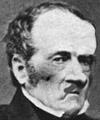 Former Senator John Bell (Constitutional Union-TN) – If Douglas was the Northern Democrat, and Breckinridge was the Southern Democrat, Bell was the border state guy. Realizing any Civil War would be fought in these states, Bell’s main goal was to keep the country out of war at all costs.
Former Senator John Bell (Constitutional Union-TN) – If Douglas was the Northern Democrat, and Breckinridge was the Southern Democrat, Bell was the border state guy. Realizing any Civil War would be fought in these states, Bell’s main goal was to keep the country out of war at all costs.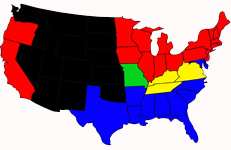 For the most part, the election results were pretty predictable. Lincoln swept the North. Breckinridge swept the South.
For the most part, the election results were pretty predictable. Lincoln swept the North. Breckinridge swept the South. 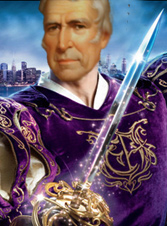
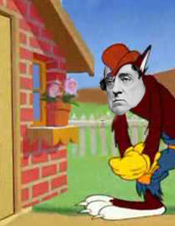
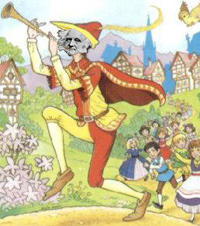
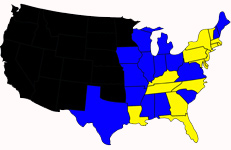 The election was ridiculously close. Both
The election was ridiculously close. Both 
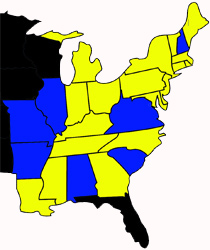 Harrison kicked Van Buren’s ass, hard core, 234-60 electoral votes, even winning Van Buren’s home state. The Harrison administration is nothing to speak of because he died within a month. His Ascendancy, President Tyler alienated his entire party by blocking their attempts to resurrect the Bank of the U. S., and went totally off the reservation by supporting the annexation of Texas. Annexation became the platform that got Democrat James K. Polk elected in 1844.
Harrison kicked Van Buren’s ass, hard core, 234-60 electoral votes, even winning Van Buren’s home state. The Harrison administration is nothing to speak of because he died within a month. His Ascendancy, President Tyler alienated his entire party by blocking their attempts to resurrect the Bank of the U. S., and went totally off the reservation by supporting the annexation of Texas. Annexation became the platform that got Democrat James K. Polk elected in 1844. 
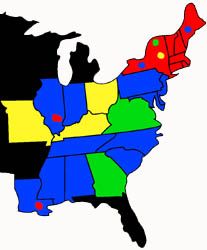 Predictably, the sections of the country that nominated their candidates stuck to them on election day.
Predictably, the sections of the country that nominated their candidates stuck to them on election day. 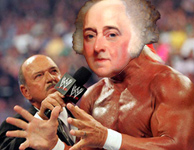
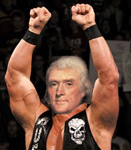

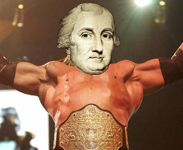
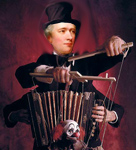
 This blog is not to be taken seriously. Seriously. I take this seriously, but you shouldn't. You should do what you want, but you'll probably enjoy this more if you don't take anything I say seriously. I mean, I mean what I say, but it's not serious. Oh also, swearing is hilarious. It shouldn't be, but it is.
This blog is not to be taken seriously. Seriously. I take this seriously, but you shouldn't. You should do what you want, but you'll probably enjoy this more if you don't take anything I say seriously. I mean, I mean what I say, but it's not serious. Oh also, swearing is hilarious. It shouldn't be, but it is.

